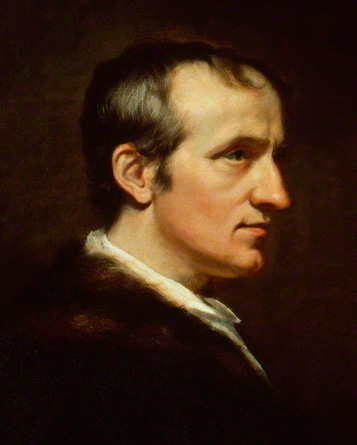| Profile | Major Works | Resources |
William Godwin, 1756-1836.

English anarchist and utopian political and social philosopher. William Godwin was the husband of early feminist author Mary Wollestonecraft and father of Mary Shelley (writer of "Frankenstein" and wife of romantic poet Percy Byssche Shelley).
William Goodwin's most famous work is his Inquiry concerning political justice (1793). Goodwin came out of the Enlightenment tradition - particularly the work of Jean-Jacques Rousseau - which was profoundly optimistic about human nature but highly critical of human institutions.
A profound optimist concerning human nature, Goodwin nonetheless recognized the exploitative nature of capitalism and proposed a utopian restructuring of society whereby those who earn more than their basic needs would distribute the surplus to the needy. In his famous 1793 plea for anarchy, Godwin posited that the pursuit of happiness is the only object of personal and social ethics. In an utilitarian ethical leap, Godwin actually went on to argue that "Justice" requires the maximization of aggregate pleasure.
The roots of Godwin's thesis may be found in Rousseau's 1754 discourse on inequality. Rousseau had identified the creation of private property as the moment when man transitioned from his calm, humble and pacific natural state into a selfish, snobbish and violent creature. Godwin followed up on that, and identified property as the root of civil laws which cause injustice and evils, oppression, servility, fraud, etc. Rousseau had identified this with civilization, and did not offer a practical solution. But Goodwin believed he could reverse that, that there was a practical way of constructing a human moral utopia and return man to his natural state. He would not abolish private property per se, but rather remove inequality in property. Once everyone had enough property, selfishness would disappear as a human motive, and with it an end to all conflict, vice, etc. In Godwin's utopia, human society would be a general shared benevolence. There would be no social distinction by occupation either - everyone would happily share in light agricultural labor (in Godwin's estimate, about half-hour a day!)
His optimistic prognostics on the ultimate "perfectibility" of mankind by a re-ordering of society led Malthus to respond with his dismal essay on population. Godwin's schemes for material benefit of poor would merely lead to a population explosion, nullify themselves and bring in a variety of moral and social evils. Godwin's replies to Malthus (1801, 1821) salvaged his own thesis using Malthus's own model. Malthus had recognized this problem did not exist among the middle classes, who were more prudent in their procreation habits. All the more reason, Godwin asserts, for property redistribution - make the poor non-poor, and they will acquire the habits of middle classes, redistributing property will "solve" the Malthusian problem.
|
Major Works of William Godwin
|
|
HET
|
|
Resources on William Godwin
|
All rights reserved, Gonšalo L. Fonseca
